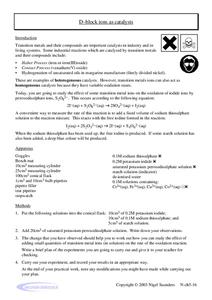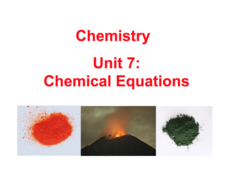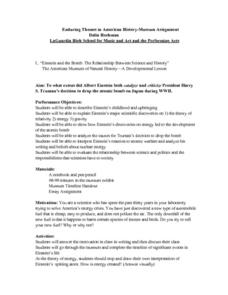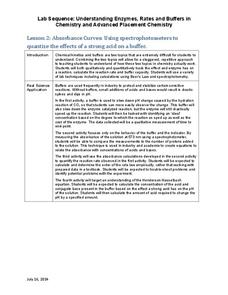Beyond Benign
Exothermic and Endothermic Reactions
How can you tell the difference between endothermic and exothermic reactions? Chemistry scholars perform and observe two chemical reactions, measure the temperature throughout, then draw conclusions about changes in energy from their...
Curated OER
Concentration and Reaction Rates
Students investigate how varying the concentrations, volumes, and other factors affects reaction rates. Students design and conduct investigations to obtain data used to create graphs of an uncatalyzed reaction vs. a catalyzed reaction....
Science Geek
Reaction Kinetics
Show your classes the science behind rates of reactions with a presentation that explains factors that affect the rate, activation energies, exothermic and endothermic processes, and the proportionality of the product and reactant...
Curated OER
Interpreting Reaction Coordinates
In this reaction coordinates worksheet, students are given a diagram of the reaction coordinate for a reversible catalyzed and uncatalyzed reaction. Students answer eighteen questions related to the diagram.
Curated OER
Reaction Mechanisms
In this reactions worksheet, students give the equation for the overall reaction, identifying the catalyst in the equation. Students create graphs and write out the rate determining step. This worksheet has 4 graphs, 2 short answers, and...
Kenan Fellows
Qualitative Kinetics: Examining the Effect of an Enzyme on a Reaction
Scholars learn about kinetics and buffers as they use qualitative and quantitative methods to understand enzyme rates and buffer capacity. The application of Beer's Law and spectrophotometry solidifies pupils' knowledge in the first of...
Curated OER
Catalase Enzyme
Students design and conduct an experiment to test their ideas about how to speed up or slow down the rate of an enzyme-catalyzed reaction. They have access to an array of physical and chemical factors that might influence enzyme...
Nuffield Foundation
Enzyme-Catalysed Synthesis
Enzymes: not just for breaking chemicals apart. Young biologists perform an experiment on potatoes. They first remove starch from potato extract. They then add the resulting liquid to samples of glucose-1-phosphate, glucose, maltose, and...
Curated OER
Kinetics Worksheet
In this kinetics learning exercise, students solve twenty one problems related to reaction rates, half life, reaction orders, catalysts, and activation energy.
Curated OER
Kinetics Practice 2-Key
In this kinetics worksheet, students solve seven problems related to chemical reactions and their rates. Students identify rate laws for mechanisms, they draw reaction diagrams, and they determine rate constants.
Curated OER
Enzyme Lab
High schoolers investigate the enzyme catalase. In this enzyme lesson plan, students observe a normal catalase reaction, they observe liver tissue, potato, chicken and apple for the enzyme catalase and they study the effects of...
Creative Chemistry
D-Block Ions as Catalysts
In this catalysts worksheet, learners use transition metal ions to catalyze oxidation reactions of iodide ions. Students measure the rate of the reactions by measuring free iodine as a product.
Normal Community High School
Chemical Equations
Viewers learn how to identify the substances in a chemical reaction, how to balance it, and the different types of chemical reactions by watching a presentation that also includes a review of monomers and polymers. The presentation...
Curated OER
Water-holding Capacity of Earth Materials
Students design and conduct an experiment to test their ideas about how to speed up or slow down the rate of an enzyme-catalyzed reaction. They have access to an array of physical and chemical factors that might influence enzyme...
Curated OER
Reaction Rates-Catalysis, Concentration, Surface Area, and Temperature
Students determine the meanings of concentration, surface area, and catalysis through an experiment. In this lesson about chemical reactions, students participate in an experiment. Students complete three different parts of the...
Curated OER
Rate Law Problems
For this rate law worksheet, students calculate the rate of reactions at specific temperatures with the given rate law for the reaction. This worksheet has 5 problems to solve.
Curated OER
Matrix Reactions
In this matrix reactions worksheet, students fill in the blank about the process of glycolysis. Students also draw an organelle- mitochondrion and label the parts with the given names.
Curated OER
Got Gas? How Much?
Learners perform an experiment that measures respiration. For this performing an experiment that measures respiration lesson, students discuss aerobic and anaerobic respiration. Learners measure the gas produced by putting...
Curated OER
What factors affect the oxidation of apples?
Students investigate why an apple turns brown after being cut open and brainstorm why this occurs. In this oxidation instructional activity students design and conduct a simple experiment, analyze their results and draw...
Curated OER
Enzyme Lab
Young scholars examine the effects of specific enzymes on samples of liver tissue, muscle tissue (chicken), apples, and potatoes.
Curated OER
Ecstasy
Students view a PSB "In the Mix" video about the effects and abuse of the drug Esctasy. They participate in a class discussion, identify the body's reaction to Ecstasy, investigate the laws surrounding drup possession and use and engage...
Curated OER
Enduring Themes in American History-Museum Assignment
Students study and research the life of Albert Einstein. They focus on the extent Albert Einstein catalyzed and criticized President Harry S. Truman's decision to drop the atomic bomb on Japan during WWII. Students answer a series of...
Kenan Fellows
Absorbance Curves: Using Spectrophotometers to Quantize the Effects of a Strong Acid on a Buffer
The Henderson-Hasselbalch equation combined logarithmic terms with the application of carbonic acid as a buffer solution. Scholars learn investigate equation and its applications through hands-on experiments. They collect data and...
Curated OER
Enzymes
This multiple-choice and short-answer enzyme quiz would work well as a pre-post test in any biology class. To differentiate, use it as a group quiz with learners paired up to discuss each question.























